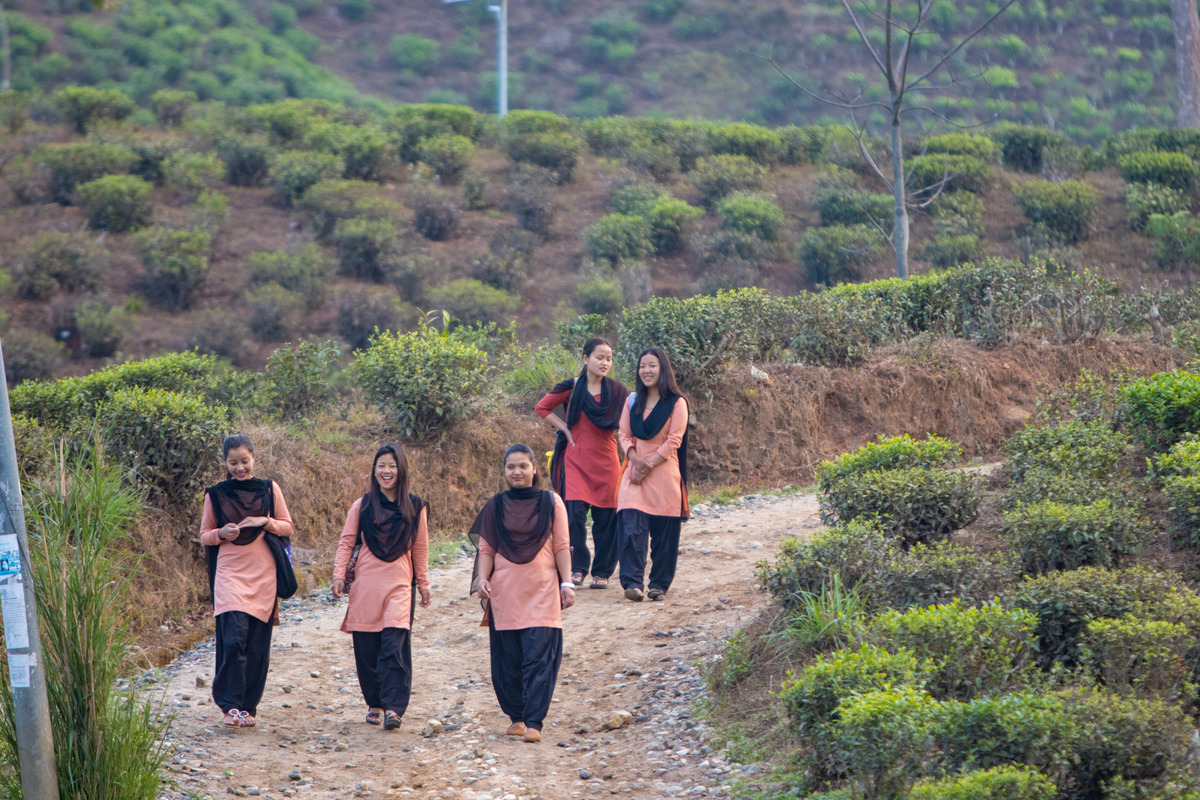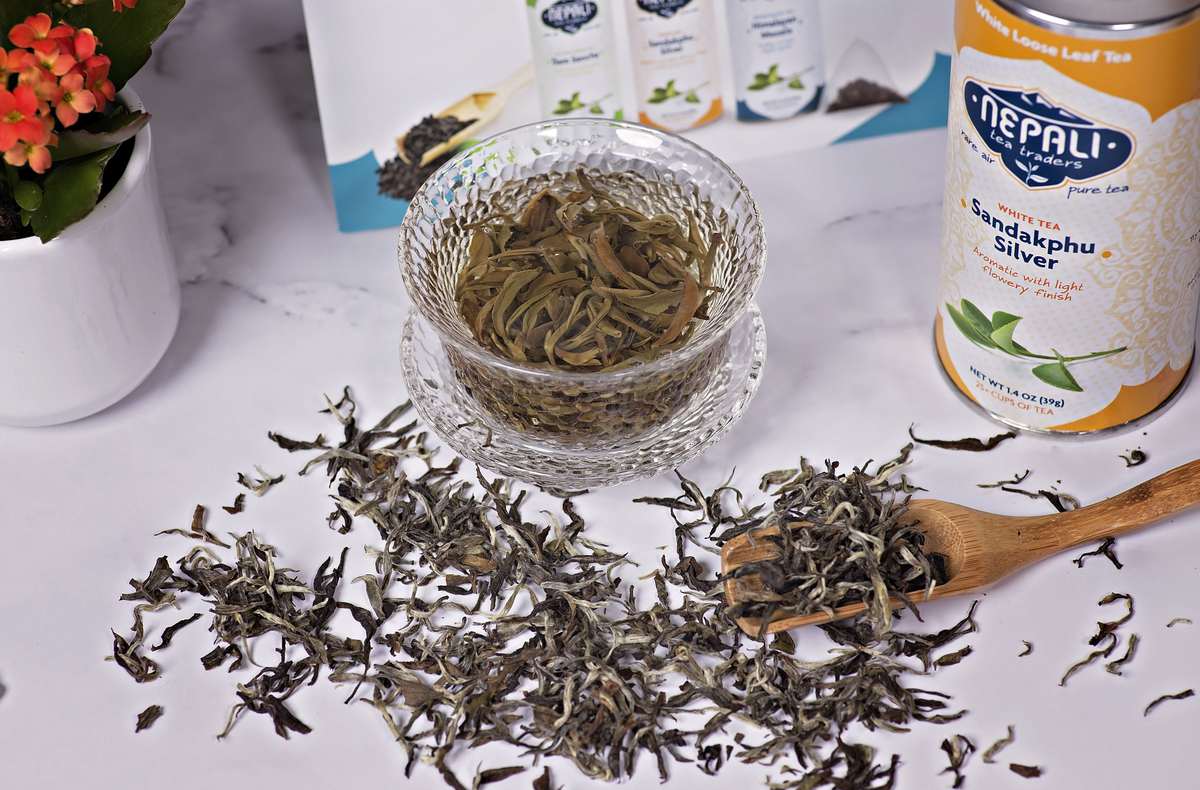Dawn, the Scent of Tea, and a Business to Share It All: Sunita Karmacharya
“Namaste. Can I offer you some tea?”
The sun rises lazily, shooing away the darkness enveloping Kathmandu Valley. A dry morning breeze sweeps into Nepal’s capital, rustling signs and gently tossing the prayer flags draped between buildings. The breeze eddys and curls, making its way to a home whose second floor window is open. Beyond the window pane is the Karmacharya’s family kitchen, just now stirring with life.
The faint scent of incense flows about the house as Indira Karmacharya, the first of the household to be awake, enters the kitchen. She turns on the faucet, the sound of water flowing reaching the ears of her sleeping children. Their dozing minds know subconsciously that in about five minutes, it will be time to wake up. Her husband, Shyam Karmacharya, is also now awake, making his way towards the kitchen as the children nestle deeper into their blankets for their last few moments of sleep. A certain aroma is now in the air, one of milk, sugar and chai. Just before it can boil over, Indira’s voice calls, “Time for tea! Get up! You have to go to school, you have to go to work!” Groggily, the five children stumble their way upstairs.
The family takes a seat on the floor, all arranged in a haphazard circle. Indira carries in a cup of tea for each person, sitting down to complete the circle. This is how the morning starts, every day. Shyam mentions the rough outline of his workday between sips, while the children fill each other in on what projects they are working on in school.
The breeze carries the fragrance of the Karmacharya’s kitchen out into the city, now filled with the scent of thousands of cups of tea. The new day in Nepal has begun.
Books in bags and shoelaces tied, the Karmacharya children make their way to the front door, ready for the school day. As soon as they step outside, they are greeted by a flurry of voices and eager questions from neighbors and friends — “Oh! Time for school! Have you had your tea?”
This was the childhood morning routine of Sunita Karmacharya while growing up in Nepal.
 Who Is Sunita?
Who Is Sunita?
Sunita is cheerful and bright as she logs into our Zoom call, a wide grin on her face. A vibrant, patterned tapestry hangs behind her, sunshine filtering in through the windows. There is an occasional video lag, but it cannot stop her stories and spirit as she fills me in on her life and her work. Born in Nepal and raised in Kathmandu, Sunita has made a name for herself as a businesswoman and entrepreneur. She is the owner of Nepali Tea Traders, a company specializing in the sale of premium loose leaf teas harvested from the mountainous regions of Nepal.
Sunita, who spent her first 19 years of life growing up in Nepal, decided to travel to the states for her higher education. She has now spent nearly half of her life in each country, solidifying herself as a citizen of two cultures.
“I think now, looking back, I was so afraid. I was 19-years-old and I didn’t speak English. But, I’m thankful that I went through all of that because I now know what not to do,” Sunita said.
American university culture opened her eyes to some of the daily comforts of home that she missed dearly. The warmth and connectedness she was accustomed to was noticeably replaced by a colder atmosphere in the states. Her fellow students were focused entirely on their own lives, eliminating much of the daily communication Sunita experienced in Nepal. But the most prominent longing of hers was tea and the bond that it cultivated between people in her childhood community.
“There’s no mom making you tea. Now, the one thing I’m trying to cultivate in my little family is that togetherness,” Sunita said.
When she and her family moved to Massachusetts and bought their own home, Sunita did not feel connected with her new community. This would change, though, when her family adopted a puppy. Suddenly, Sunita’s family was the talk of the block. They had plenty of opportunities to chat with their neighbors whom they encountered while out on daily walks.
Pursuing a greater sense of local rapport has always been an important mission for Sunita. She often wondered how she could cultivate such a feeling in her new Massachusetts home, not realizing that she had the perfect tool in her back pocket.
“I just had to ask, ‘Do you want some tea?’ Now I pretty much know everybody in the neighborhood,” Sunita said.
 Becoming a Nepalese Businesswoman
Becoming a Nepalese Businesswoman
When asked about the state of male and female inequality in Nepal, Sunita took a deep sigh. Although women occupying positions of power within business is slowly becoming more common in the United States, the same cannot be said for Nepal.
“In Nepal, even now, people still tend to keep all the girls at home because they are sort of a burden to the family. They are liabilities. The girls are seen by the family as, ‘Our responsibility is to teach you how to do all of the household stuff so that we can marry you off to a man and you can do all of those things.’ Once a woman gets married, they settle into the husband’s home with his family. This is less common in Kathmandu, the capital where more people are migrating. This is where I was raised and I was lucky,” Sunita said.
Sunita expressed immense gratitude for the progressive mindset of her parents. She highlighted the influence of her mother, a woman of strength and iron will, driven by a desire to ensure that her children would have more opportunities than she did. She had always been a house mom, taking care of Sunita and her siblings while Mr. Karmacharya had to travel far for work in pursuit of greater income for the family. Due to the fact that Sunita’s parents were both the eldest siblings of their families, they could not go to school. This being so, education was a critical element for both of them.
“My mom is a very strong-willed woman. She made many sacrifices and compromises. When she and my dad married, she said, ‘I’m not living here in the village because if I do that, then my children are going to have a similar life to what I am living.’ So she left my dad and my dad’s home without a sandal. She hopped on a bus and went to Kathmandu with just one backpack and my two brothers. My dad followed her, but still, it took a lot of courage. My parents went through their own struggle, but decided to change our future,” Sunita said.
Shyam and Indira Karmacharya worked tirelessly to instill a foundation of equality in their household.
“You guys are equal to us. We will give equal education to all of you so that you can make a name for yourselves,” Sunita recounted her parents’ words.
She expressed that this was the familial mindset they had while growing up. She had dreams of traveling to America for her education, even though in her community, there were girls getting married when they were 16- and 18-years-old.
Despite the progressive viewpoint of her parents, Sunita can still recognize the undertones of such gendered expectations in her own household.
“My husband is from Nepal and I’ve known him for a long time. Yet, even in our life, if you were to come and observe, you would see the unspoken rule. Naturally, I go and start cooking, and although he cooks too, it’s still something about how we have seen our parents do their thing. It’s automatic in our mind,” Sunita said.
The Impacts of Nepali Tea Traders
Forever touched by her mother’s resolve to give her daughters every opportunity that she possibly could, a young Sunita’s mind translated this fire into the spirit of entrepreneurship.
“My mom, one mom, changed the lives of my sister and I. This is where I had the idea that if she could change that, can you imagine being an entrepreneur?” Sunita said.
Nepali Tea Traders is currently working with 45 Nepalese farmers and has partnered with the Nepal Youth Foundation, supporting impoverished children and opening as many opportunities as possible to them. Following the spirit of her mother, Sunita has also personally taken on the task of giving her farmers’ daughters the opportunity to get an education through direct funding.
Sunita detailed how the direct funding process was not always the method that Nepali Tea Traders used. Although stories of the girls’ successes were being shared, when Sunita and other executive members visited the farms they collaborated with, they realized that the young girls were still working day-to-day gathering tea leaves. It became clear that this was an incredibly common occurrence. Due to Nepali Tea Traders not having the status of a non-profit registration, direct donations are not possible in the name of the company. So, Sunita makes personal donations from the company’s profits to the schools at which the girls she supports will be students.
When she tried giving money directly to the families, it was often used to buy new materials for the farm. However, when Sunita began to donate the funds directly to the schools, the girls had uniforms, books, and a full year’s tuition covered and reserved for them.
“Maybe the girls want to be astronauts. Whatever they want, they can be because of the tools that we are giving them right now. I want to maximize on that because that will give me more satisfaction than all the things I’m doing here,” Sunita said.
As a new mother with a 15-month-old son, Sunita felt the stress of caring for both a business and a family pressing on her. She wasn’t quite sure of how to find a balance until she came to a key realization.
“We put so much pressure on ourselves to run certain things. But I created this business for more freedom. This is my own business and I can run it the way I want. So, I’m going to prioritize my family right now and just let the business run itself for a while until I’m able to get back,” Sunita said.
Sunita came to peace with the fact that she and the business were in this life together. She could adjust the business to make it work for her and her family so that she would not have to miss out on the new experiences that life would be bringing her way. In the same way that a child grows and discovers their own goals and talents, Nepali Tea Traders is also evolving. In the next few years, Sunita hopes to increase the number of partner farmers, increase one-on-one conversations with consumers, and expand into the Northeastern region of Nepal.
Sunita’s Philosophy
“This is not just Nepal or America. I know the two cultures very well, but I think there’s something universal: The need for me to be seen as me. I don’t need to be recognized as a business woman to be accepted because I don’t care if I am accepted. I am fully me. This is who I am. I used to think that business and personal life are two different things, but now I’ve scratched that idea. There’s no separation. They are different aspects of my life, but they’re all meshed up together. There’s no layer of facade anymore.
You should talk to people. These days, Google tells you pretty much everything, from businesses in Nepal to what is happening there. We should be perfectly okay to reach out to different companies. Let’s say you’re specifically interested in women running a business. You can just do a Google search and find all of these amazing companies that are doing just that and reach out.
You should also travel. That’s something that we as a family want to do. You get so much more out of spending a week in the places that you want to learn about then just talking about them. You can actually witness, you can touch and feel, use all your five senses.
I feel like I am an ever-evolving being and the older I get, the more relaxed I am about where I am. We go through this life in our heads seeing how far we can go, what we can and cannot be, how we can be and how we cannot be, and trying to adjust ourselves into the norm of what’s accepted by society. But, it’s okay. Wherever you are, it’s completely fine. You are who you are and you are exactly where you’re meant to be. You are only supposed to do the things that you want to do, not because somebody else wants you to do them. I think that if every single person could repeat that over and over again, we would be so much different than where we are today, still following the crowds. Place all judgment aside and just be there.
Doing what comes from the heart has so much more power. If it’s important, you will find time. We should just try to do everything and explore all the options before we give up. If something is your true heart’s desire, then do not give up. You will find the resources and people and everything that you need.” Sunita said.
Kathmandu is bathed in the colors of the drowsy day, yellows, reds, and purples of the sunset. The breeze has calmed, and the heat of the day has dissipated. The Karmacharya family is off to sleep after another long day. While the events of tomorrow may be indefinite, one thing is for certain—it will all begin with tea.
Connect with Nepali Tea Traders:
nepaliteatraders.com
Instagram: @NepaliTeaTraders
Facebook: @NepaliTeaTraders

Such a lovely story…. You can be proud of you….we are proud of you!
Your cheerful attitude and your passion for life have been contagious. I am eternally grateful for the positive influence you have had on my perspective of the world.
All I can say is “wow.” And “thank you.”
Sadhana